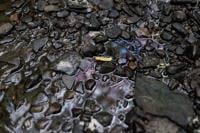A synthetic rubber manufacturer accused of increasing the cancer risk for the nearby majority-Black community in Louisiana told a federal appeals court it will have to shut down “likely permanently” if it's forced to meet the Biden administration’s deadline to reduce emissions.
Denka Performance Elastomer on Tuesday blamed a new Environmental Protection Agency at more than 200 industrial plants, arguing that other, more dangerous facilities face a 2-year deadline to comply while it was singled out with an “illegal and politically motivated” 90-day deadline.
The Denka plant manufacturers neoprene, which is used to make wetsuits, automotive belts and other items, and employs roughly 250 people, the company said. It’s located roughly a half-mile (.8 kilometer) from an elementary school in Reserve, Louisiana, and is within an 85-mile (137-kilometer) stretch of the state known officially as the Mississippi River Chemical Corridor. Colloquially it is called Cancer Alley.
The company has been at the — and of the Biden administration's promise to use its enforcement and regulatory power to make life better for residents who live in communities, often poor and majority-minority, that disproportionately bear the brunt of pollution impacts.
“Absent relief from the 90-day implementation period, (Denka) will have no ability to comply with the rule and will be forced to shut the facility, likely permanently,” the company told a Washington, D.C. federal appeals court.
When the agency originally proposed tougher emissions limits, Denka had a longer timeframe to comply. But the EPA sued the company last year, finding the facility posed an “imminent and substantial endangerment” to the nearby community. And EPA said that finding justified a shorter, 90-day deadline specified in its final rule.
“Let them shut down,” said Sharon Lavigne, founder of Rise St. James, a group that has fought against the plant. “They poisoned the people in Reserve."
The new regulations target a range of emissions including chloroprene and will reduce cancer risk substantially, according to agency. The EPA declined to comment on the litigation.
The company wants the EPA’s 90-day deadline put on hold and says the agency won’t consider lengthening that timeline until Denka sets out an emissions reduction plan, according to the filing. In recent years, the company has significantly reduced emissions and argues the government has overstated the risk from chloroprene, the chemical emitted by the plant.
Environmental activists filed civil rights complaints with the EPA in 2022, arguing Louisiana air regulators have allowed new facilities in places where Black residents already endure too much pollution and won't do enough to set better controls at dangerous facilities.
After of racial discrimination, the EPA dropped its investigation without making any concrete findings. Extracting commitments from state regulators wasn't possible by a July deadline, the agency said. That was a who had hoped the investigation would force change.
EPA officials said, however, there were other ways to reduce emissions. They sued to argue it posed an unacceptable cancer risk. The agency eventually asked for that lawsuit to be put on hold until it issued new emissions rules for industrial facilities.
“(Denka) will need at least two years to plan, develop, test and install the controls required by the rule,” the company said in a court filing.
To succeed, the company needs to show EPA's deadline will cause “irreparable harm.” It uses the threat of closure to argue that the court needs to act quickly.
The company talked with the agency about an extension, but federal officials demanded emissions reduction commitments that Denka refused to accept.
In a statement, the company thanked Louisiana Gov. Jeff Landry and other state officials for their “steadfast support.” When Landry was attorney general, his office sued the EPA over its civil rights investigation, arguing the agency exceeded its authority when it targeted discrimination that allegedly harmed Black residents more, instead of focusing only on intentional discrimination. A federal judge handed the state an early win in that litigation this year.
___
The Associated Press receives support from the Walton Family Foundation for coverage of water and environmental policy. The AP is solely responsible for all content. For all of AP’s environmental coverage, visit








































